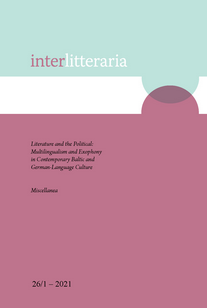Zweisprachigkeit in den Literaturen Estlands
Bilingualism in the Literatures of Estonia
Author(s): Liina LukasSubject(s): Comparative Study of Literature, Estonian Literature, German Literature, Russian Literature, Finno-Ugrian studies, Interwar Period (1920 - 1939), Theory of Literature
Published by: Tartu Ülikooli Kirjastus
Keywords: bilingualism; exophony; Estonian Literature; Estonian-Russian Literature; Baltic-German Literature;
Summary/Abstract: In a multilingual cultural space such as the (former and contemporary) Baltic region, bilingualism, both oral and written, has been rather normality than exception. This also finds an expression in the literatures of this region. In the following I will examine the phenomenon of bilingualism and multilingualism in the literatures of Estonia in history and today. First, I will examine the historical forms of bilingualism before the foundation of the Republic of Estonia, against the background of the complicated oral and written language relations throughout history. Then I explore their topicality in the interwar and Soviet periods, and today. I also ask about the motivation of the authors to change or mix languages in their work, whether to reach a wider audience or a new poetic quality. Examples are from the work of Paul Fleming, Reiner Brockmann, Jacob Johann Malm, August Kitzberg, Ivar Ivask, Jaan Kaplinski, Igor Kotjuh, Øyvind Rangøy and Veronika Kivisilla.
Journal: Interlitteraria
- Issue Year: XXVI/2021
- Issue No: 1
- Page Range: 11-30
- Page Count: 20
- Language: German

